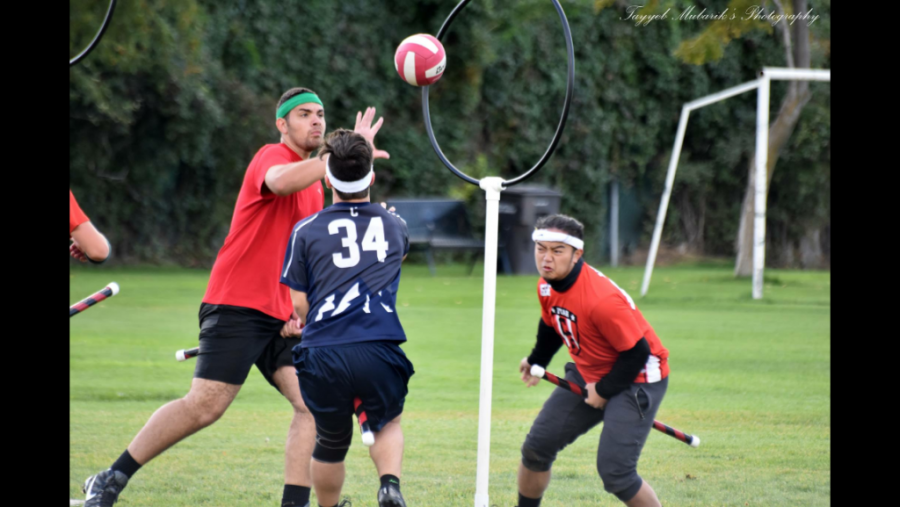Quidditch, the action-packed, airborne sport that dominates the Harry Potter world, has landed on the U campus. Crimson Fliers, the U’s competitive Quidditch team, brings the game to life with enthusiastic team players and a full tournament schedule. They play on a national level throughout the year working toward the ultimate prize: the United States Quidditch Cup.
The game of Quidditch has actually been around — sans wizards — on college campuses since 2010, when the national U.S. Quidditch league was formed. Quidditch made its debut on the U campus seven years ago as well. It began with a student named Sequoia Thomas when she and a group of friends formed a team over a mutual love for the game, and the Crimson Fliers have been consistently competing since.
Muggle Quidditch (for non-wizards, i.e. everyone) is surprisingly quite similar to the magical, flying matches depicted in J.K. Rowling’s world. A team consists of three chasers, two beaters, a keeper and a seeker. The chasers score points with the quaffle, utilized as a handy volleyball, down the field, of which a normal soccer or football field will suffice. The chasers pass the quaffle back and forth down the arena via running or kicking. They must watch out for the beaters, using dodgeballs as bludgers, to avoid being hit, for if hit, they are out of play. Finally, the seeker must seek out the snitch, as the game cannot end until the snitch is caught. Coincidentally, the snitch is a cheery, golden yellow and is also a small ball. However, it does not have wings nor does it evade capture by spiraling upwards into the sky. Rather, the snitch is attached to the waistband of the snitch runner. The snitch runner is an additional athlete (also dressed in all yellow) not belonging to either team who does all they can to avoid being caught.
Danika Bond, this year’s team manager and co-captain with Matt Jackson of Crimson Fliers said, “I enjoy the community that comes along with playing the sport. No matter where you go in the country, you will be able to find Quidditch people.”
Indeed, this unique sport has become impressively widespread. Today over 4,000 athletes and 200 teams nationwide participate in US Quidditch league, including U student athletes, fulfilling the vision statement the USQ posts on their website of envisioning a future in which “[…] every person in the United States is aware of Quidditch as a sport and has opportunities to play and engage at all levels.”
Quickly gaining in popularity, Quidditch has become more common and more competitive since its beginnings in 2010, in part due to its incredibly versatile skill set, making it attainable and enjoyable for most people.
“Everybody should try this sport,” Bond said. Combining elements of basketball, rugby and dodgeball to create a fast paced, co-ed, full contact sport, Quidditch is definitely a multipurpose athletic experience.
“All kinds of people can find a part of the sport that they enjoy,” Bond said. “It is full contact and has a lot of things going on at once, so it can be difficult, but it’s definitely worth a try.”
But the question remains: where are the flying broomsticks? Though they don’t fly, there are broomsticks. Each player must compete the entire game, including running, tackling, passing and scoring, with a broomstick between their legs, and it must not drop or touch the ground.
The game requires finesse, athleticism and creativity. It’s also a game where participants can come and just have fun.
“It is a very accepting community, so all people are welcome to play,” Bond said.
This year, the Crimson Fliers have had a full itinerary as they’ve traveled all over the West for competitions. The Crimson Fliers have played against several teams: Boise State, Northern Colorado University, Northern Arizona University, University of Idaho, University of Colorado and Utah State University, to name a few. Next month the team will be traveling to California for another regional tournament. The national tournament takes place later in the spring in April.
It creates a competitive and athletic environment, but Quidditch also facilitates unique friendships. This is especially true for the Crimson Flier team.
“It’s a good way to make connections,” Bond said. “I love Quidditch because of the friends you make.” Though unique, Quidditch and the Crimson Flier experience is definitely something anyone could relate to and be a part of.
“I plan on being a part of the community for as long as I possibly can,” Bond said.
l.randall@dailyutahchronicle.com


